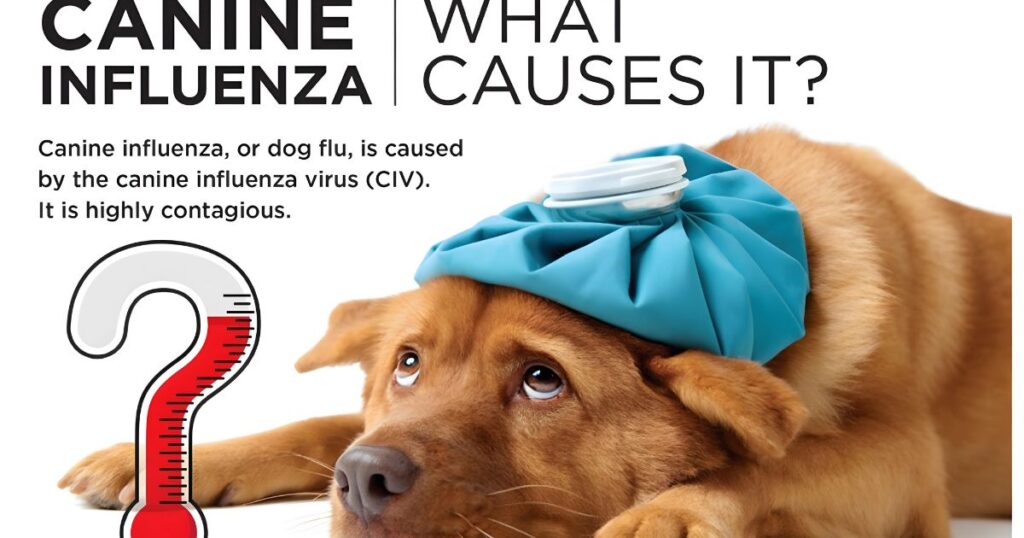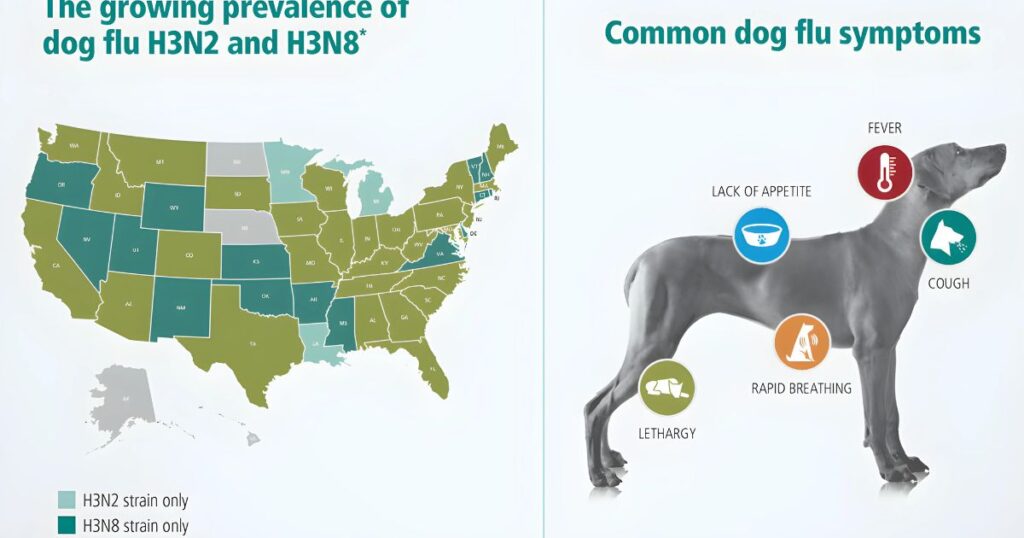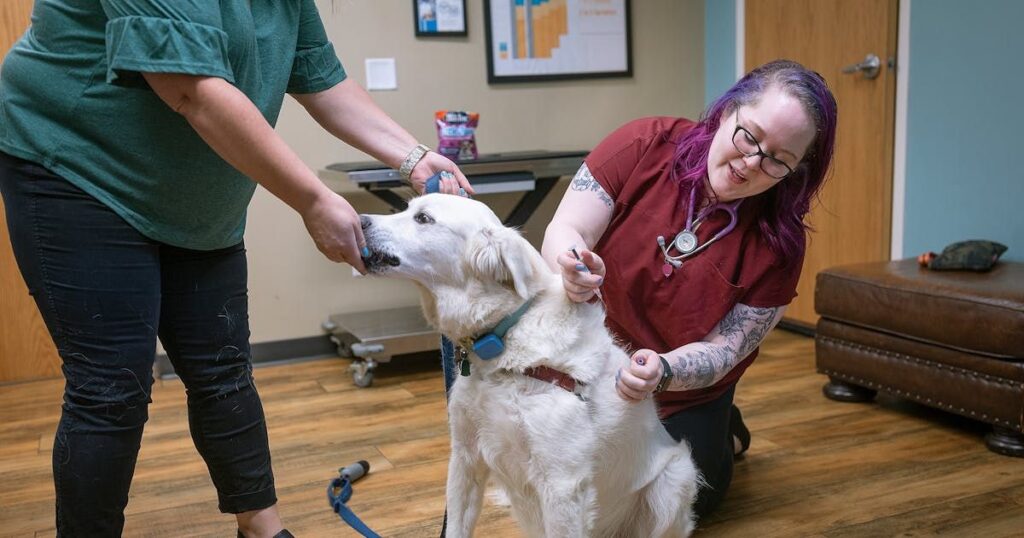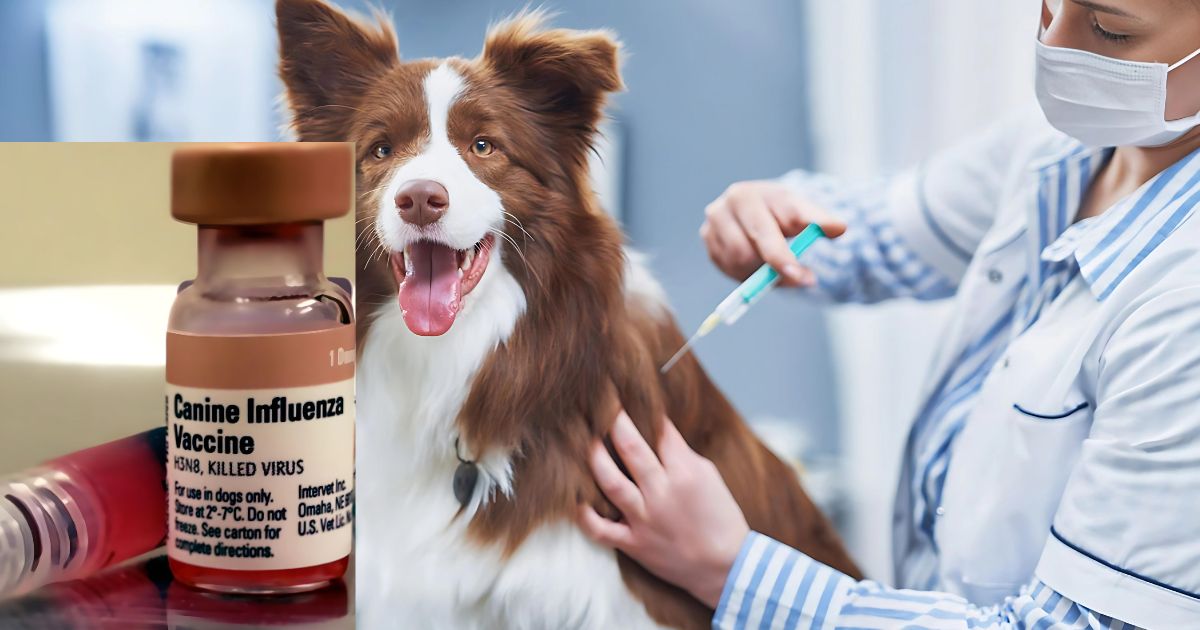Introduction: Canine Influenza Vaccine
Canine influenza, often referred to as the “dog flu,” is a highly contagious respiratory illness in dogs caused by influenza A viruses. While some dogs may only experience mild symptoms, others can become quite sick. Fortunately, canine influenza vaccines can help protect your furry friend from this potentially serious illness. This article will delve into everything you need to know about canine influenza vaccines, including:
- What is canine influenza?
- Signs and symptoms of canine influenza
- Canine influenza vaccine types and efficacy
- Canine influenza vaccine protocols and boosters
- Risks and side effects of canine influenza vaccine
- Who should get a canine influenza vaccine
- Preventing the spread of canine influenza
Read More: Digital News Planet
What is Canine Influenza?
Canine influenza is a respiratory infection caused by specific influenza A viruses. These viruses can be further categorized into different strains based on their protein structures. The two most common strains affecting dogs are:

- Canine influenza virus (H3N8): This strain was first identified in racing greyhounds in Florida in 2004 and has since become widespread across the United States.
- Canine influenza virus (H3N2): This strain originated in Asia and emerged in the United States in 2015.
Signs and Symptoms of Canine Influenza
The signs and symptoms of canine influenza can vary depending on the severity of the infection, the dog’s age, and overall health. Common symptoms include:
- Coughing (often a dry, hacking cough)
- Fever
- Runny nose or nasal discharge
- Lethargy
- Loss of appetite
- Sneezing
- Difficulty breathing (in severe cases)
If you notice any of these signs in your dog, especially after they have been around other dogs, it’s important to contact your veterinarian right away. Early diagnosis and treatment can help prevent complications and shorten the duration of the illness.

Canine Influenza Vaccine Types and Efficacy
There are currently two main types of canine influenza vaccines available:
- Bivalent vaccine: This vaccine protects against both the H3N8 and H3N2 strains of canine influenza.
- H3N2-specific vaccine: This vaccine only protects against the H3N2 strain.
The efficacy of canine influenza vaccines varies depending on the specific vaccine, the dog’s immune system, and the strain of virus circulating. Studies have shown that bivalent vaccines can be highly effective (around 90%) in reducing the severity of illness and viral shedding in dogs exposed to canine influenza. However, no vaccine is 100% effective, and some dogs may still experience mild symptoms even after vaccination.
Canine Influenza Vaccine Protocols and Boosters
Canine influenza vaccines are typically administered as a two-dose series, with the second dose given 2-4 weeks after the first. The initial vaccination series can begin as early as 6 weeks of age for puppies.
The need for canine influenza vaccine boosters depends on several factors, including the type of vaccine used and the dog’s risk of exposure. Currently, there is no consensus on a universal booster recommendation. Some veterinarians may recommend annual boosters, while others may recommend boosters based on individual risk factors. Consulting with your veterinarian is essential to determine the best vaccination protocol for your dog.
Risks and Side Effects of Canine Influenza Vaccine
Canine influenza vaccines are generally considered safe for healthy dogs. The most common side effects are mild and short-lived, such as:
- Soreness at the injection site
- Mild fever
- Lethargy
In rare cases, more serious reactions like allergic reactions can occur. If you notice any concerning signs after your dog receives a canine influenza vaccine, contact your veterinarian immediately.
Who Should Get a Canine Influenza Vaccine?
The decision of whether or not to vaccinate your dog against canine influenza depends on several factors, including:
- Age: Puppies, senior dogs, and dogs with weakened immune systems are more susceptible to severe illness from canine influenza and may benefit from vaccination.
- Lifestyle: Dogs who frequently socialize with other dogs at boarding facilities, dog parks, doggy daycare, grooming salons, or other places where dogs congregate are at higher risk of exposure and may benefit from vaccination.
- Travel: Dogs who travel frequently, especially to areas with known outbreaks of canine influenza, may benefit from vaccination.
- Overall health: Dogs with underlying health conditions are more susceptible to complications from canine influenza and may benefit from vaccination after consulting with a veterinarian.
Canine Influenza Vaccine Schedule
The recommended canine influenza vaccine schedule for most dogs involves a two-dose series:
- First dose: Administered as early as 6 weeks of age for puppies.
- Second dose: Given 2-4 weeks after the first dose.
Booster vaccinations may be recommended depending on several factors, including the type of vaccine used, the dog’s risk of exposure, and your veterinarian’s advice. There is no single, universally accepted booster protocol. Some veterinarians recommend annual boosters, while others may recommend boosters based on individual risk factors. Discussing your dog’s specific needs with your veterinarian is crucial to determine the most appropriate vaccination schedule.

Canine Influenza Vaccine Price
The cost of a canine influenza vaccine can vary depending on your location, the type of vaccine used, and your veterinarian’s pricing structure. Typically, the cost falls within the range of $30 to $80 per dose. Some veterinary clinics may offer discounts for bundled vaccinations, including the canine influenza vaccine along with other core vaccines.
Canine Influenza Vaccine Side Effects
Canine influenza vaccines are generally considered safe for healthy dogs. The most common side effects are mild and short-lived, typically resolving within a day or two. These may include:
- Soreness at the injection site
- Mild fever
- Lethargy
In rare cases, more serious reactions like allergic reactions can occur. If you notice any concerning signs after your dog receives a canine influenza vaccine, contact your veterinarian immediately.
Canine Influenza Vaccine Names
There are several commercially available canine influenza vaccines. Two of the most common brand names in the United States are:
- Nobivac Canine Flu (Intervet/Merck): This is a bivalent vaccine that protects against both the H3N8 and H3N2 strains.
- Influenza A H3N2 Canine (Zoetis): This vaccine protects specifically against the H3N2 strain.
Where to Get a Canine Influenza Vaccine
Canine influenza vaccines are typically administered by licensed veterinarians. You can schedule an appointment with your regular veterinarian to discuss the vaccine and whether it’s right for your dog. Many veterinary clinics also offer vaccination clinics where you can get your dog vaccinated without an appointment.
Canine Influenza Vaccine Near Me
If you’re looking for a veterinarian who offers canine influenza vaccines in your area, there are several ways to find one:
- Call your local animal shelters or humane societies. They may offer vaccination clinics or be able to refer you to a veterinarian who does.
- Search online directories like the American Veterinary Medical Association (AVMA) website or veterinary clinic websites in your area. Many clinics allow you to search for services offered, including vaccinations.
- Use a search engine and type in “canine influenza vaccine near me.”
Canine Influenza Vaccine Shortage
While there haven’t been widespread shortages of canine influenza vaccines in recent years, it’s always a possibility. If you’re concerned about availability, it’s best to discuss vaccination with your veterinarian well in advance, especially if your dog is at high risk of exposure.
Pros and Cons of Dog Flu Vaccine
Pros:
- Reduces the risk of severe illness from canine influenza
- Helps protect other dogs, especially those who are more susceptible (puppies, senior dogs, immunocompromised dogs)
- May lessen the severity of symptoms and shorten the duration of illness even if a dog contracts canine influenza
Cons:
- Not 100% effective (some dogs may still become infected)
- May cause mild side effects in some dogs
- Cost of the vaccine and potential vet visit fees
Ultimately, the decision of whether or not to vaccinate your dog against canine influenza is a personal one. Discussing the pros and cons with your veterinarian and considering your dog’s risk factors will help you make the best decision for your furry friend.
FAQs;
1: Does my dog need a canine influenza vaccine?
Whether your dog needs a canine influenza vaccine depends on several factors, including age, lifestyle, overall health, and prevalence of the virus in your area. Discuss these factors with your veterinarian to determine the best course of action for your dog.
2: How long does the canine influenza vaccine last?
The duration of protection from the canine influenza vaccine is not definitively established. Some studies suggest protection may last for a year, while others indicate it might wane sooner. There is currently no universally accepted booster recommendation. Consult your veterinarian to determine the best vaccination schedule for your dog.
3: What is the H3N2 vaccine for dogs?
The H3N2 vaccine for dogs is a specific type of canine influenza vaccine that protects against the H3N2 strain of the virus. There are also bivalent vaccines available that protect against both H3N8 and H3N2 strains.
4: Is Bordetella canine influenza?
No, Bordetella is not canine influenza. Bordetella is a bacteria that causes kennel cough, a respiratory illness in dogs. While both kennel cough and canine influenza can cause coughing, they are caused by different pathogens and require different vaccines.
5: What vaccine covers canine influenza?
Two main types of vaccines cover canine influenza:
- Bivalent vaccine: Protects against both H3N8 and H3N2 strains.
- H3N2-specific vaccine: Protects only against the H3N2 strain.
6: What is canine influenza?
Canine influenza is a highly contagious respiratory illness in dogs caused by specific influenza A viruses. Symptoms can range from mild (coughing, sneezing) to severe (fever, difficulty breathing).
7: How is the canine influenza vaccine administered?
The canine influenza vaccine is typically administered as a shot under the skin, usually in a two-dose series with the second dose given a few weeks after the first.
8: Is canine influenza distemper?
No, canine influenza and distemper are different diseases. Distemper is a more serious viral illness that can affect multiple body systems in dogs. Both distemper and canine influenza require separate vaccinations.
9: What is the difference between canine influenza and parainfluenza?
Canine influenza and parainfluenza are both respiratory illnesses in dogs caused by different viruses. Canine influenza is caused by influenza A viruses, while parainfluenza is caused by canine parainfluenza virus. Both can cause coughing, but canine influenza may cause additional symptoms like fever and lethargy.
10: How to prevent canine influenza?
Vaccination is the most effective way to prevent canine influenza. In addition, practicing good hygiene (handwashing, avoiding contact with sick dogs) and minimizing exposure to high-risk areas (boarding facilities, dog parks) can help reduce the risk of infection.
11: What are the side effects of the canine influenza vaccine?
The most common side effects of the canine influenza vaccine are mild and short-lived, such as soreness at the injection site, mild fever, or lethargy. Serious reactions are rare, but if you notice any concerning signs after your dog receives the vaccine, contact your veterinarian immediately.
12: What is canine Bordetella?
Canine Bordetella, also known as kennel cough, is a highly contagious respiratory illness in dogs caused by the bacterium Bordetella bronchiseptica. Symptoms typically include a hacking cough. The Bordetella vaccine helps protect dogs from this illness.




